Today was part at sea and part docked as we have an overnight. Thus we try to wriggle it as much as possible to sail the scenic bits by daylight. That brought us at 05.30 at the entrance to the Dardanelles. You cannot be much later otherwise you arrive late in Istanbul. But it was getting twilight already and thus there were things to be seen. Cruising is not only about lazing about, it is also about culture and for that you will have to get out of bed early sometimes. The Location Guide had to get up as well as there was a narration by him from 05.30 onwards. We had good visibility and thus everything was clearly visible from the Monuments to the Villages dotting the green hill sides. I woke up at the more decent time of 06.30 and by the time I made it to the Lido we were just going around the major bend in the passage. The only one where you cannot see around the corner and the radar does not help either as there is a hillside which blocks the radar from detecting ships. But there is a good Vessel Traffic Control which keeps the pilot updated and that avoids us from running into nasty surprises.
This bend is what fascinates me most about the whole Dardanelles. On each side there is a fortress and in the good old days, long time ago, they had a chain in place all the way across. The chain could be raised or lowered depending on whether foe or friend came by or more often who had paid the river tax and who had not. In those days the sailing vessels were relatively small and thus a regular thick chain would do the trick. Every time I pass by here I wonder, how thick a chain would be needed to bring the modern day vessels to a standstill and pay their dues? With the Koningsdam putting 40,000 hp. in the water means it would have to be a very thick chain.
The Northside Fortress in the Bend.
Pilotage is compulsory for this area and he (I have not seen any Female Turkish pilots yet) boards just before Cenekale. This is also the location where Customs and Immigration boards, but as we were coming from Kusidasi we were already cleared there. Pilotage ends at Gelibolu or Gallipoli where the Dardanelles enter the Sea of Marmara. From there the ships can sail by themselves until they reach the beginning of the Bosporus where a pilot will either bring the ship to a dock in Istanbul or will take it through to the Black Sea.
We arrived at the Pilot station at 14.30 and then it is about 45 minutes before we come to the dock. And then the fun and games start. Docking in Istanbul is not for the faint hearted. Today we had a lot of wind coming from the North and also a lot of current coming from the North. That current keeps coming from the North until you come closer to the dock and then it bounces back from the shore side and then it suddenly comes from the South. The problem is, you never know exactly where the change is.
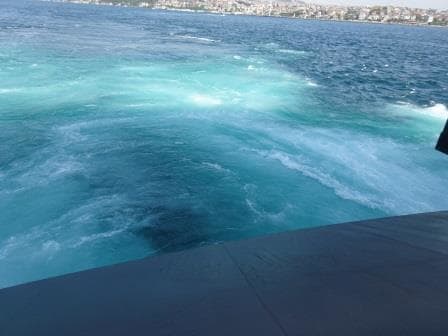
This is what the water looks like if you put the Azi pods full astern to stop in position after the turn. I do not think a iron chain would stand any chance against that.
Thus the best option is then, make the turn, stop about a 100 meters off the dock, keep the stern in the wind and watch. Watch what current and wind are doing with the ship. Once that is known you can bring the ship under an angle which balances the wind and current influence and then go slowly sideways to the dock. Slowly, so you can keep adjusting for the constant varying influence of wind and current.
That takes a little bit of time but it makes docking safe. And thus we did not completely make our target of being fully docked at 16.00 hrs. but it took 10 minutes extra. But as the first shuttle bus to the Grand bazaar was only going at 16.30 hrs. nobody was really inconvenienced. We have shuttle buses going as the local authorities are upgrading all the docks. As a result no more than two cruise ships can currently dock here at the same time, but as the season has not really started here, there were no issues as we were the only ship in port.
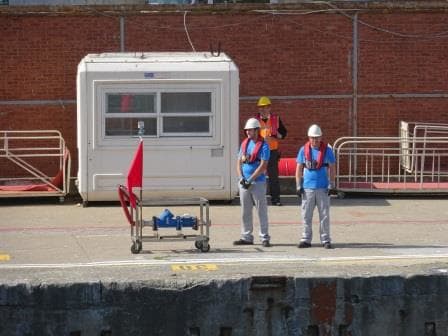
The ropes go to these gentlemen, who are also the Watermen for connecting the fresh water hoses. The red flag indicates the location where the stern should stop.
I spent arrival on the mooring deck aft checking on the proficiency of the mooring team there and to see if more support was needed to get them into the routine of the ship. Hence the photos.
And thus we will stay overnight and then have a full day tomorrow. I am not going ashore here as I am teaching the crew at the moment how to handle watertight doors properly. As these doors can be lethal when not correctly used I am going through the training with small groups so I can ensure everybody’s full focus. But I feel as a sort of gramophone who plays the same tune every hour. Most crew is going off tonight and will then have time tomorrow either in the morning or in the afternoon.
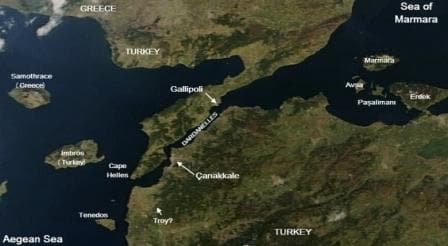
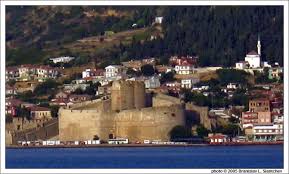
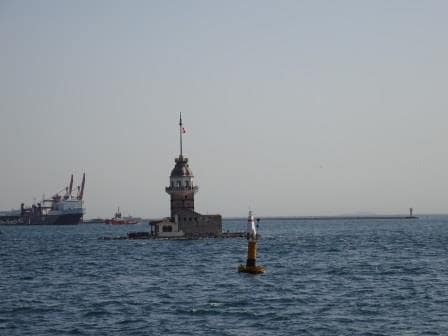
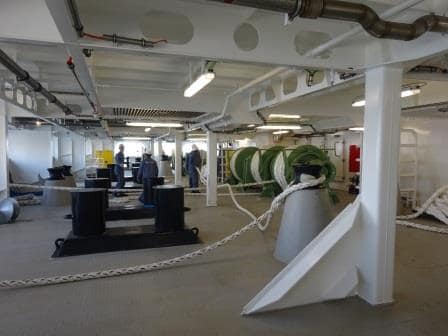

April 20, 2016 at 4:55 pm
Very impressive, Captain, the mooring deck at the stern. Are the azipods on the Koningsdam any more powerful than on the Nieuw Amsterdam, or more in number?
April 21, 2016 at 12:19 am
Good morning,
they are the same design but a bit more advanced and can produce more “oomph” with the same propellor.
Best regards
Capt. Albert
April 21, 2016 at 12:04 am
re: the Watermen for connecting the fresh water hoses.
I am surprised are you still buying water from ashore? I have not been to sea since 1976 but by then on cargo ships we had sufficient 2 stage flash evaporator water making on board to not ever buy from shore.
Greg Hayden
Vista CA USA
April 21, 2016 at 12:18 am
Thank you for reading my blog.
At sea we make all our own water using excessive heat from the engines or the eletricity generated by them. (Exhaust gas boilers, evaporators, reverse osmosis) in port we run an minimal harbor mode and then an extra boiler would be needed to produce fresh water. Although the oil price has dropped significantly in the recent past, it is still about 50% cheaper per ton of water to obtain it from the shore than to make it on board.
Best regards
Capt. Albert
April 21, 2016 at 12:30 am
Good morning,
As shown on photos in previous blogs, the promenade deck width is less than before as more space is given to the indoor public rooms. A very wide promenade deck was not longer needed for the mustering of the guests under the lifeboats as with 2500 guests this routine was not longer viable as it would take too long to get everybody in place. Hence the decision to muster in the lounges and make those lounges a bit wider. The Promenade deck is still a full circle and you can walk it two to three abreast without problems. But overtaking for faster walkers is less easy when a whole group is on the move.
I hope this helps.
Best regards
Capt. Albert
April 21, 2016 at 1:30 pm
How do you handle people in wheelchairs at muster station.
Some are 1 deck up and others are in different sections on the show room
Some up top and others in the middle and some at the bottom.
April 22, 2016 at 8:13 am
Thank you for reading my blog.
For wheelchairs and others with Special Needs we have support troops. A. We have special operators in the Elevators who reserve the Elevators for those who have walking issues. The rest is kept out. B. All our elevators are on emergency power and if that falters then there is still one Elevator in each staircase which will work. C. If all elevators would break down, then we have motorized Stair ascenders / descenders. These are little machines which can climb up and down the stairs and you can just hook a wheel chair onto it. D. We have special crew who will look after people with Special Needs if those people do not have family to help. During the drill anybody with Special Needs can phone the Front desk and ask for help.I tested it recently and it was an interesting experience to be pushed at great speed to my muster station. So there are backup plans to ensure nobody is left behind.
Best Regards
Capt. Albert.
April 22, 2016 at 5:50 pm
Can’t help but comment to your answer regarding wheelchair passengers and others with special needs in times of emergencies, Captain Albert! You remind me of Max Ward, once the owner of Wardair, a charter airline. He reportedly spot-checked each new aircraft by also sitting in the different chairs in the cabin to see if all was in tip-top shape for the passengers 🙂
April 24, 2016 at 1:31 am
And by “Cenekale” I presume you mean Çanakkale? 🙂
April 24, 2016 at 9:17 am
Yes indeed, I tried to get that small twirl thing under the C in my computer and then the whole word came out like this.
Best regards
Capt. Albert